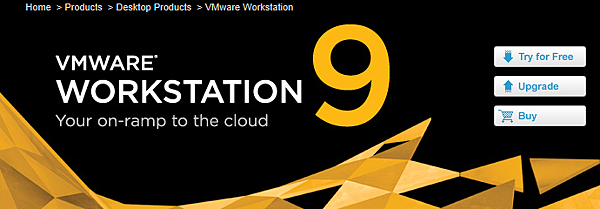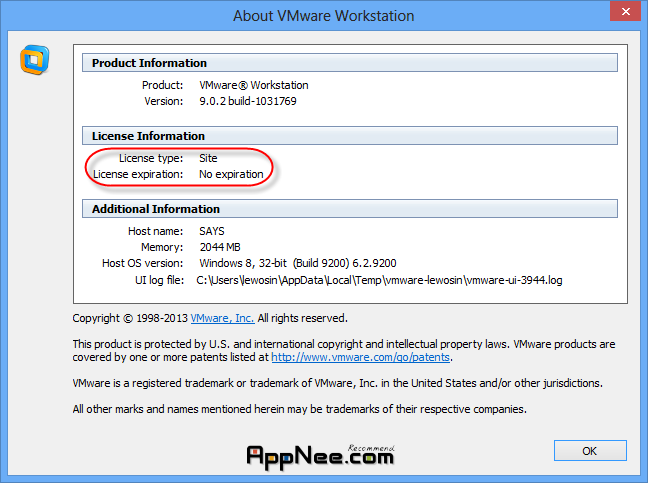
- #Vmware workstation 9 free version install
- #Vmware workstation 9 free version software
- #Vmware workstation 9 free version code
- #Vmware workstation 9 free version license
- #Vmware workstation 9 free version iso
VMware Player and VMware Workstation work on Linux and Windows.
#Vmware workstation 9 free version install
You can install VirtualBox on Linux, Windows, Solaris, macOS, and FreeBSD. While VirtualBox works on a wide range of operating systems, there are slight limitations with VMware. You can only run guests that use the same platform as the host.ĭeciding between the two virtualization platforms may come down to your host OS.You need to enable hardware virtualization in UEFI/BIOS.The host machine needs to have Intel VT-x or AMD-V CPU features.
#Vmware workstation 9 free version code
Running the code directly on hardware allows you to enhance the VM performance. Hardware virtualization emulates hardware devices from the host. VirtualBox and VMware support hardware virtualization. The disadvantage is that VM performance is lower compared to hardware virtualization. This type of virtualization allows you to run virtual machines that use a different platform than the host.
#Vmware workstation 9 free version software
Software virtualization emulates a complete computer system and runs guests on top of it. VirtualBox supports software virtualization, while VMware doesn’t.
#Vmware workstation 9 free version license
VMware Workstation Player is free, while other VMware products require a paid license

#Vmware workstation 9 free version iso
iso file used for the given VM (linux.iso, windows.iso, etc.)įree, under the GNU General Public License Installed with the VBoxGuestAdditions.iso file Requires additional conversion utility for more VM types VMware VSphere and Cloud Air (on VMware Workstation) VMDK, Microsoft’s VHD, HDD, QED, Vagrant, Docker Up to OpenGL 3.3, DirectX 10 Max of 2GB of video memory 3D acceleration enabled by default Up to OpenGL 3.0 and Direct3D 9 Max of 128 MB of video memory 3D acceleration enabled manually USB 2.0/3.0 support requires the Extension Pack (free) NAT, Bridged, Host-only + Virtual network editor (on VMware workstation and Fusion Pro) Not attached, NAT, NAT Network, Bridged adapter, Internal network, Host-only adapter, Generic (UDP, VDE) Preallocated: provisioned disks Dynamically allocated: thin provisioned disks Preallocated: fixed disks Dynamically allocated: dynamically allocated disks Snapshots only supported on paid virtualization products, not on VMware Workstation Player Graphical User Interface (GLI) and Command Line Interface (CLI) Linux, Windows, Solaris, FreeBSD + macOS (with VMware Fusion) Linux, Windows + macOS (requires VMware Fusion) If you need virtualization software with more features and larger-scale projects, you can check out Workstation Pro. You can install the free virtualization software if you have a Linux or Windows OS host. It is used for managing and creating virtual machines but works best when running a single VM. If you want to use the Player for commercial use, you need to pay for the Workstation Player commercial license. The company underlines that the free version is for students and educators. VMware Workstation Player is free 圆4 virtualization software available for non-commercial use. VMware has a number of virtualization products. Take a look at how virtual machines compare to containers in a head-to-head comparison. Note: Another way to create isolated virtual environments is to use Docker containers. It included features such as support for USB2/USB3 and RDP.

In 2010, Oracle introduced the VirtualBox Extension Pack, a closed-source complemental package with additional features. You can run VirtualBox on Linux, Windows, Mac OS, and Oracle Solaris. Additionally, it lets you establish a managed connection between the VMs and even the host if needed. The software allows you to run virtual machines on your host operating system. It is a free, open-source virtualization product, distributed under the GNU General Public License (GPL) version 2. VirtualBox is Oracle’s x86 and AMD64/Intel64 virtualization software. In this tutorial, you will learn about the difference between VirtualBox and VMware. While type 1 is more suitable for large production environments, hosted hypervisors are used for VMs run on personal computers. The most popular type 2 hypervisor software are VirtualBox and VMware.


 0 kommentar(er)
0 kommentar(er)
